Watch our Executive Director Chris Coulter at the Munich Security Conference!
Watch our Executive Director at #MSC2026!
Our Library
Explore our publications, from research papers and series to educational materials, covering all aspects of conflict transformation and peace promotion.
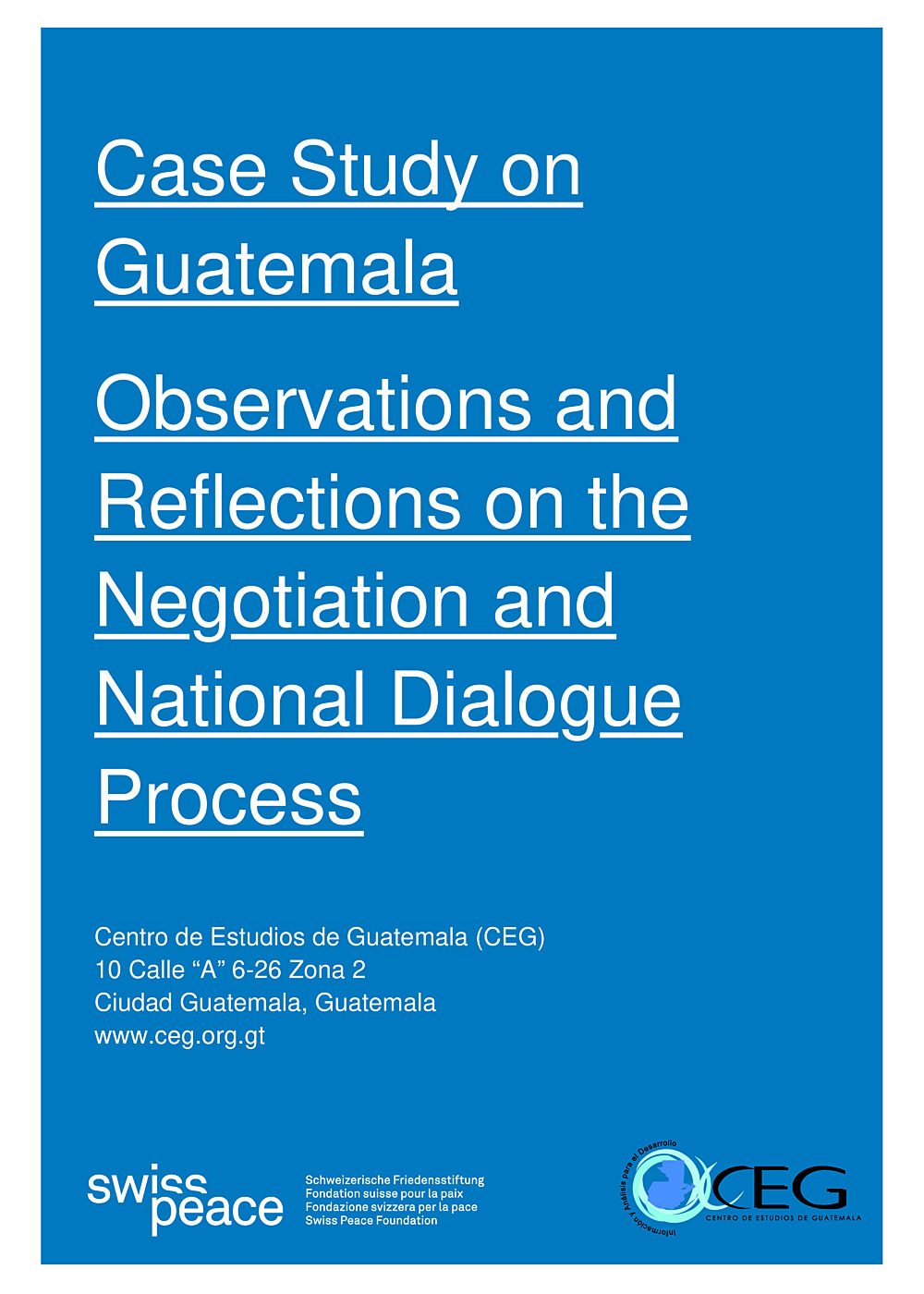
Observations and Reflections on the Negotiation and National Dialogue Process: Case Study on GuatemalaNational Dialogue Handbook: Case Studies
This publication is one of six case studies – others include Libya, Mali, Nepal, Sudan, and Tunisia – that inform the Handbook’s findings. The overall aim of the project is to improve National Dialogues and enhance the capacities and contributions of conflict parties, local stakeholders and external actors towards their successful implementation.
- Year2017
- Author(s)Centro de Estudios de Guatemala (CEG), swisspeace
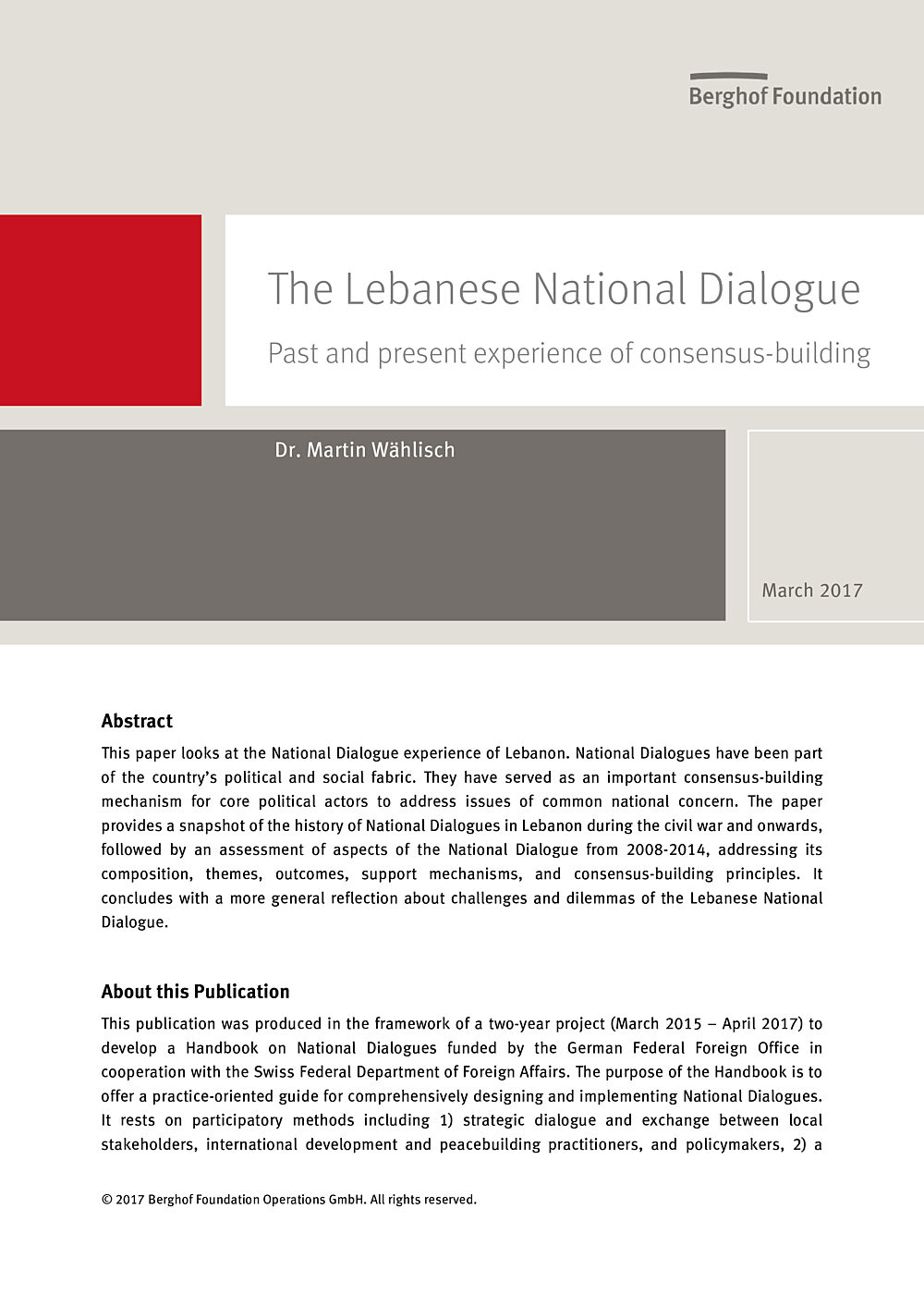
The Lebanese National Dialogue: Past and present experience of consensus-buildingNational Dialogue Handbook: Case Studies
This paper looks at the National Dialogue experience of Lebanon. National Dialogues have been part of the country’s political and social fabric. They have served as an important consensus-building mechanism for core political actors to address issues of common national concern. The paper provides a snapshot of the history of National Dialogues in Lebanon during the civil war and onwards, followed by an assessment of aspects of the National Dialogue from 2008-2014, addressing its composition, themes, outcomes, support mechanisms, and consensus-building principles. It concludes with a more general reflection about challenges and dilemmas of the Lebanese National Dialogue.
- Year2017
- Author(s)Martin Wählisch
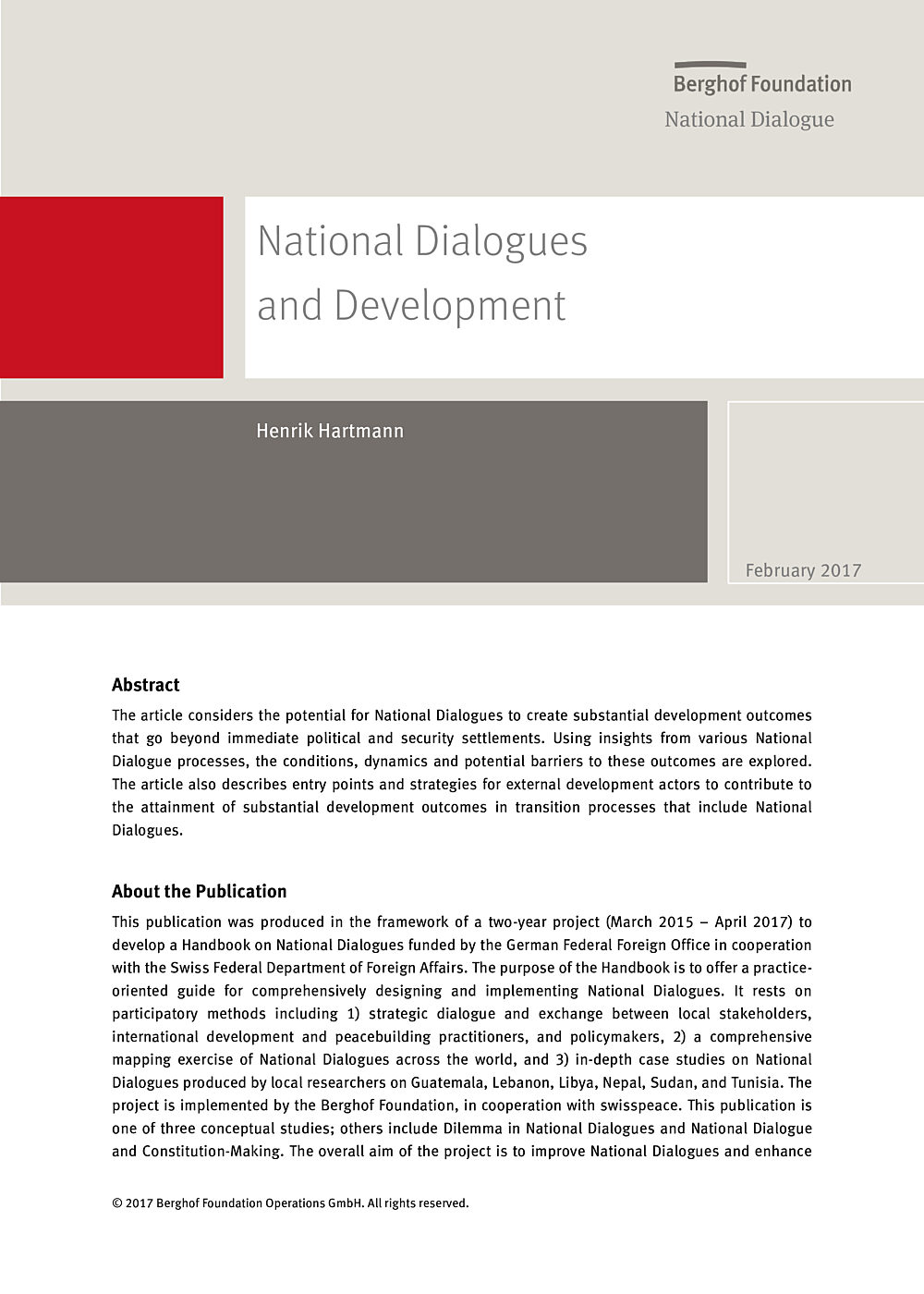
National Dialogues and DevelopmentNational Dialogue Handbook: Conceptual Studies
The article considers the potential for National Dialogues to create substantial development outcomes that go beyond immediate political and security settlements. Using insights from various National Dialogue processes, the conditions, dynamics and potential barriers to these outcomes are explored. The article also describes entry points and strategies for external development actors to contribute to the attainment of substantial development outcomes in transition processes that include National Dialogues.
- Year2017
- Author(s)Henrik Hartmann
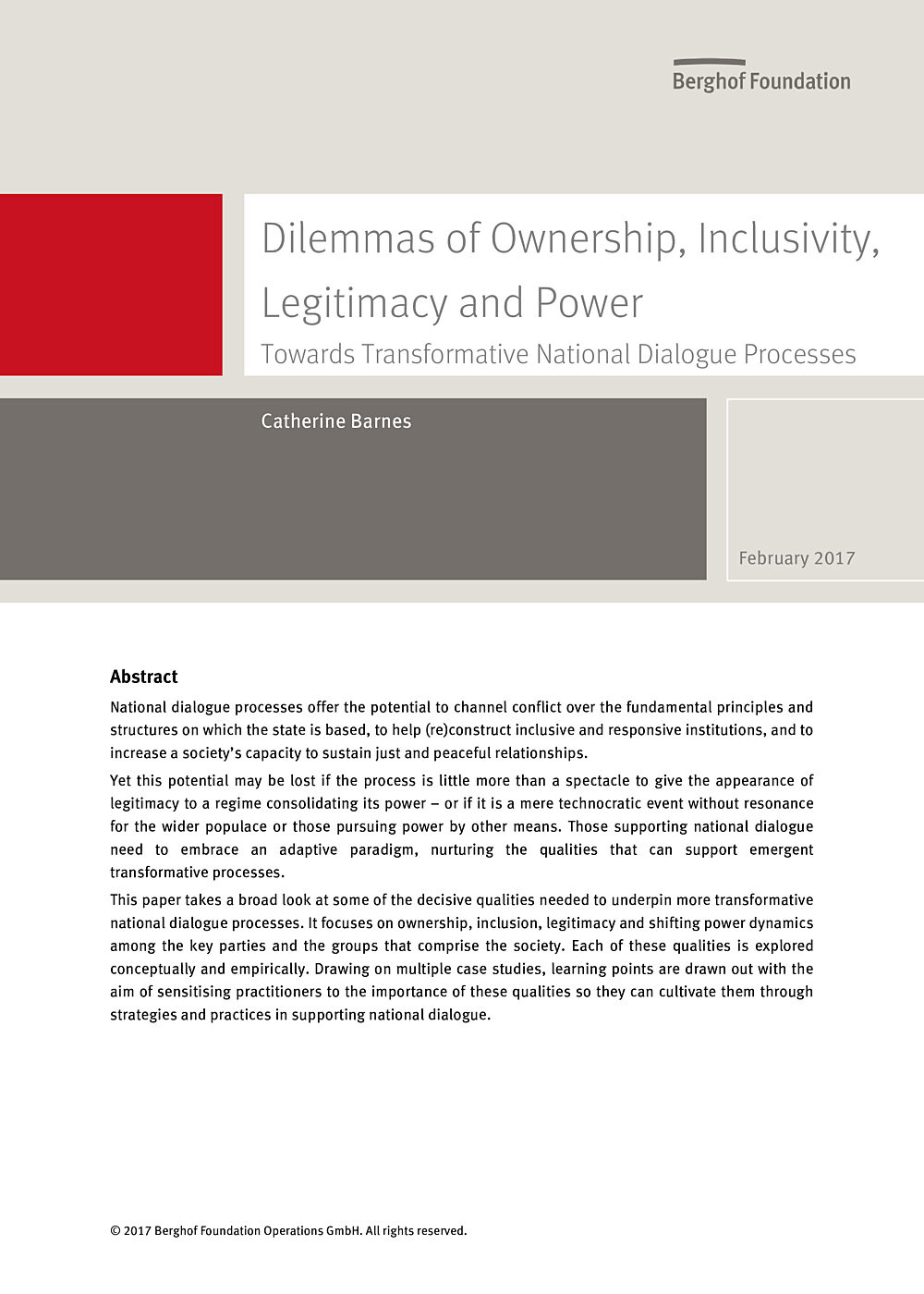
Dilemmas of ownership, inclusivity, legitimacy and power: Towards transformative National Dialogue processesNational Dialogue Handbook: Conceptual Studies
This paper takes a broad look at some of the decisive qualities needed to underpin more transformative national dialogue processes. It focuses on ownership, inclusion, legitimacy and shifting power dynamics among the key parties and the groups that comprise the society. Each of these qualities is explored conceptually and empirically. Drawing on multiple case studies, learning points are drawn out with the aim of sensitising practitioners to the importance of these qualities so they can cultivate them through strategies and practices in supporting national dialogue.
- Year2017
- Author(s)Catherine Barnes
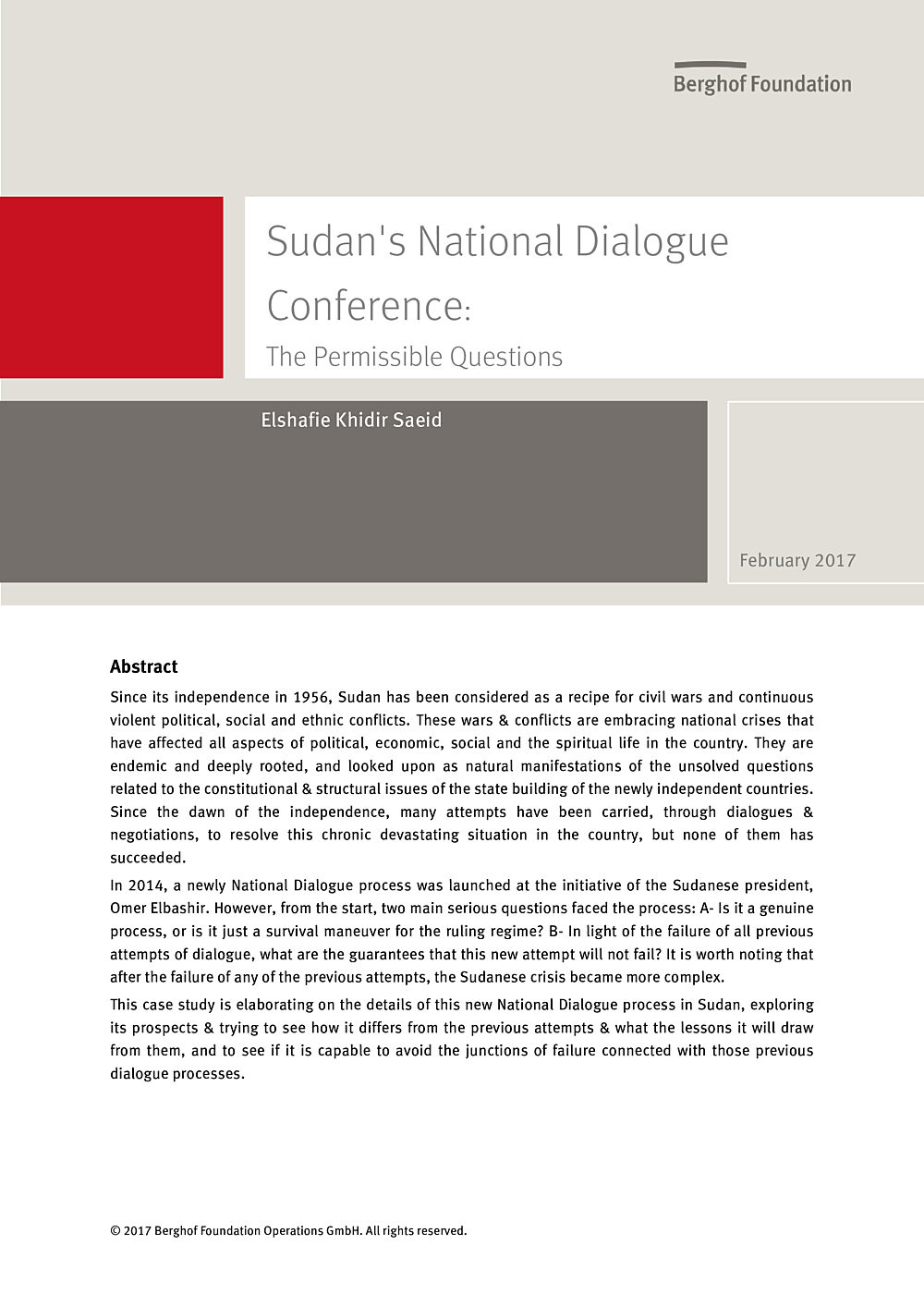
Sudan's National Dialogue ConferenceThe Permissible Questions
This case study is elaborating on the details of the new National Dialogue process in Sudan, exploring its prospects and trying to see how it differs from the previous attempts and what the lessons it will draw from them, and to see if it is capable to avoid the junctions of failure connected with those previous dialogue processes.
- Year2017
- Author(s)Elshafie Khidir Saeid
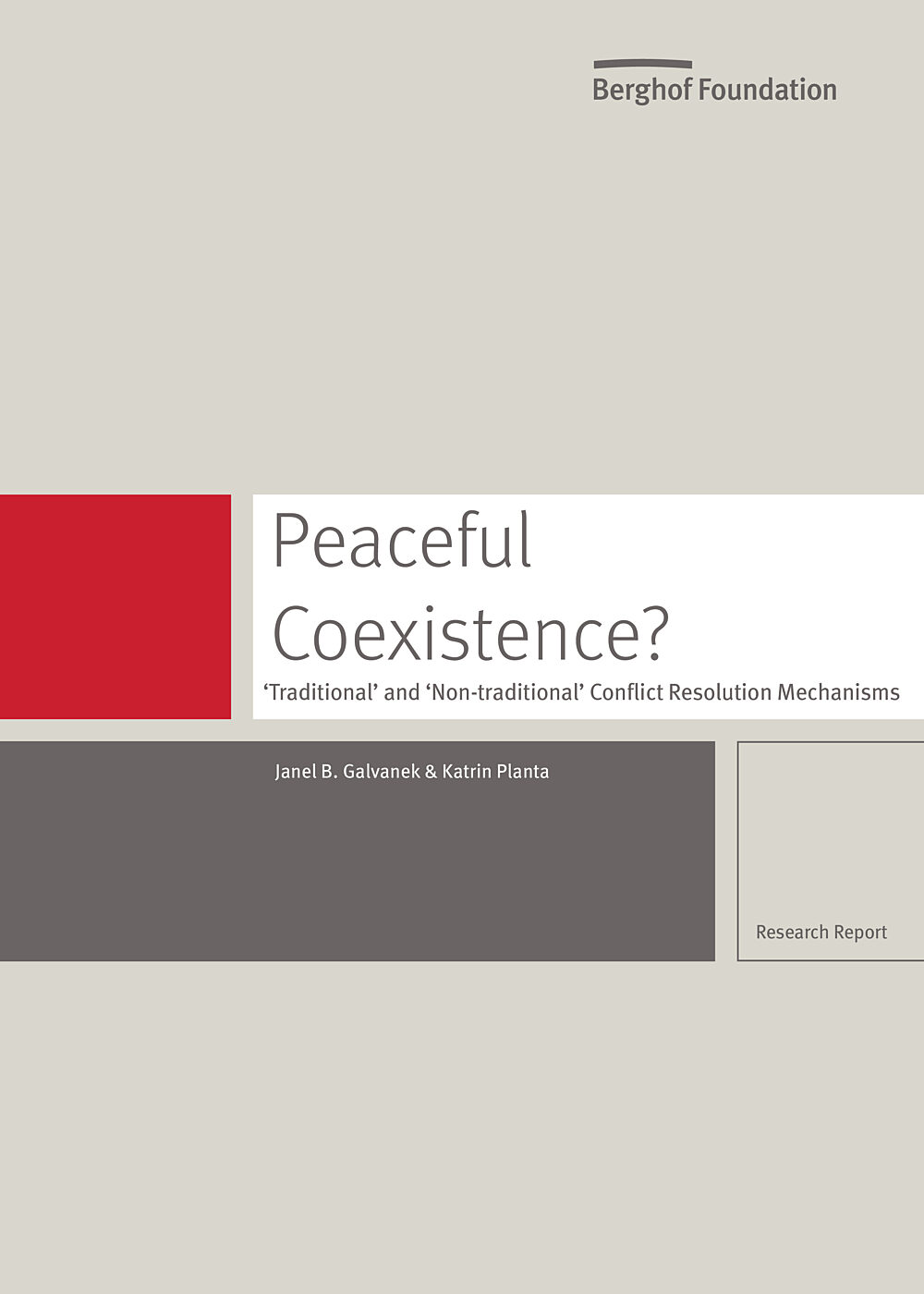
Peaceful Coexistence?‘Traditional’ and ‘Non-traditional’ Conflict Resolution Mechanisms
This report is the final analytical report of a comparative research project generously funded by the German Foundation for Peace Research and implemented by the Berghof Foundation. The project analyzes the forms of coexistence between ‘traditional’ (indigenous, local, community-based) and ‘non-traditional’ (imported, liberal, state-based, Western) approaches to conflict resolution, and is based on field research in Colombia, Liberia and Northeast India. Its central line of inquiry examines whether the coexistence of traditional and non-traditional mechanisms of conflict resolution leads to tension and competition between these mechanisms, thereby potentially furthering conflict, or whether the coexistence leads to more (or better) conflict resolution options for the population, thereby promoting conflict settlement processes and outcomes.
- Year2017
- Author(s)Janel B. Galvanek, Katrin Planta
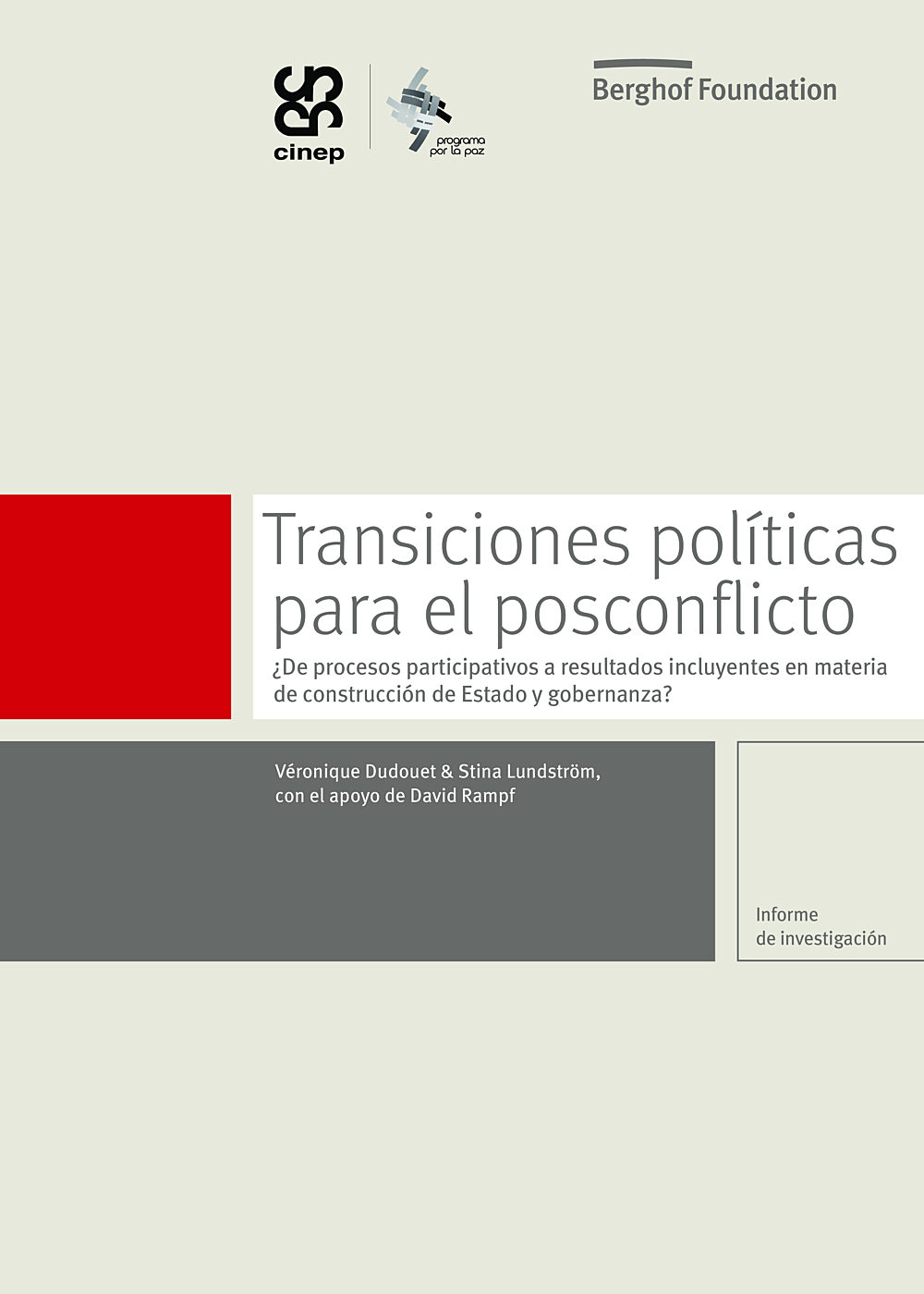
Transiciones políticas para el posconflicto¿De procesos participativos a resultados incluyentes en materia de construcción de Estado y gobernanza?
El presente informe de investigación se propone aportar a los debates académicos y de políticas sobre el tema, mediante la presentación de los resultados comparativos obtenidos de un proyecto de investigación colaborativa de 28 meses (febrero 2013-junio 2015) financiado por el Centro Internacional de Investigación para el Desarrollo (Canadá) y titulado “Cómo evitar la recaída en el conflicto mediante acuerdos políticos y construcción de Estado incluyentes tras conflictos intraestatales: oportunidades, enfoques y lecciones aprendidas”.
- Year2017
- Author(s)Véronique Dudouet, Stina Lundström
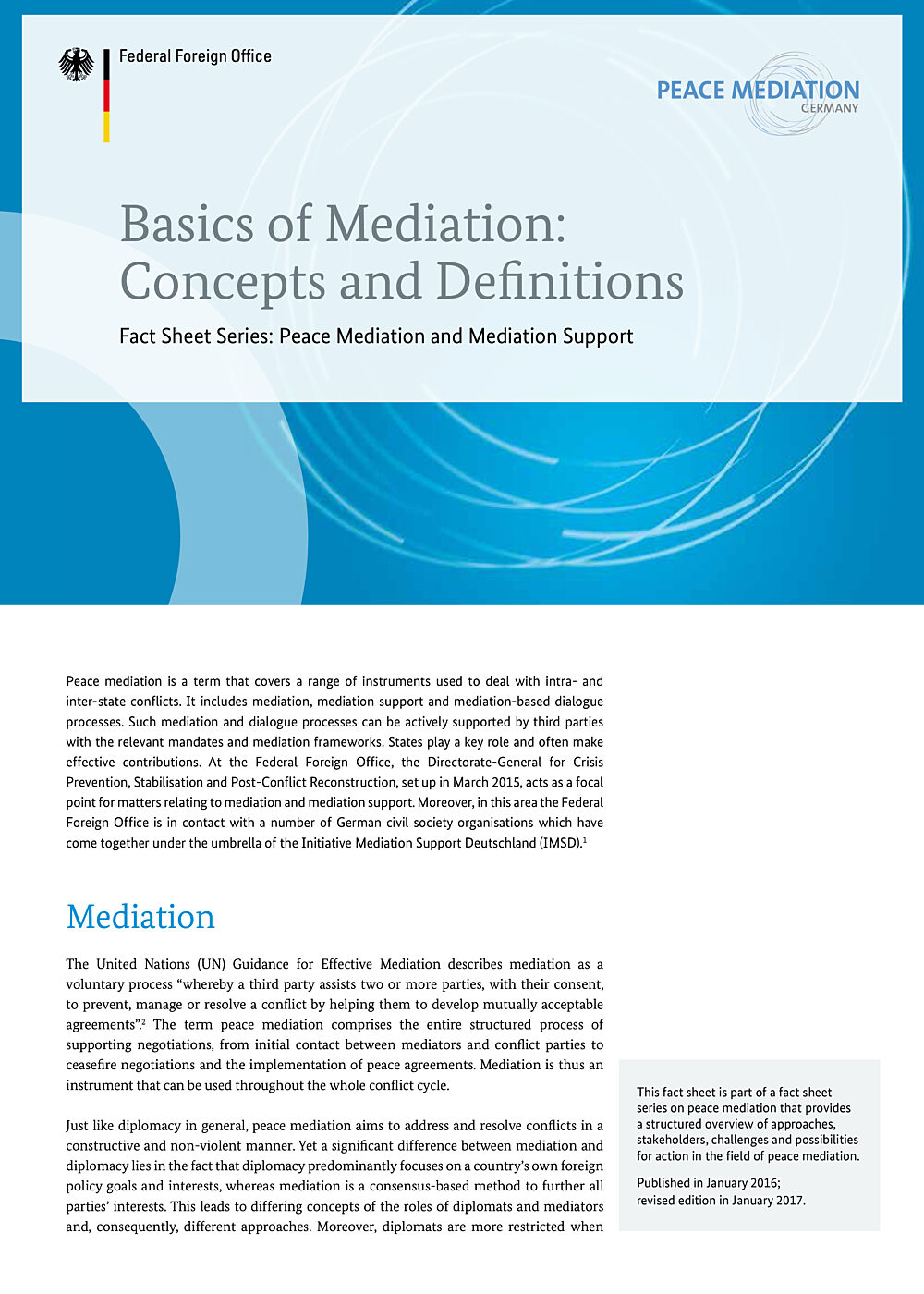
Basics of Mediation: Concepts and DefinitionsFact Sheet Series: Peace Mediation and Mediation Support
This fact sheet is part of a fact sheet series on peace mediation that provides a structured overview of approaches, stakeholders, challenges and possibilities for action in the field of peace mediation.
- Year2017
- Author(s)German Federal Foreign Office, Initiative Mediation Support Deutschland (IMSD)
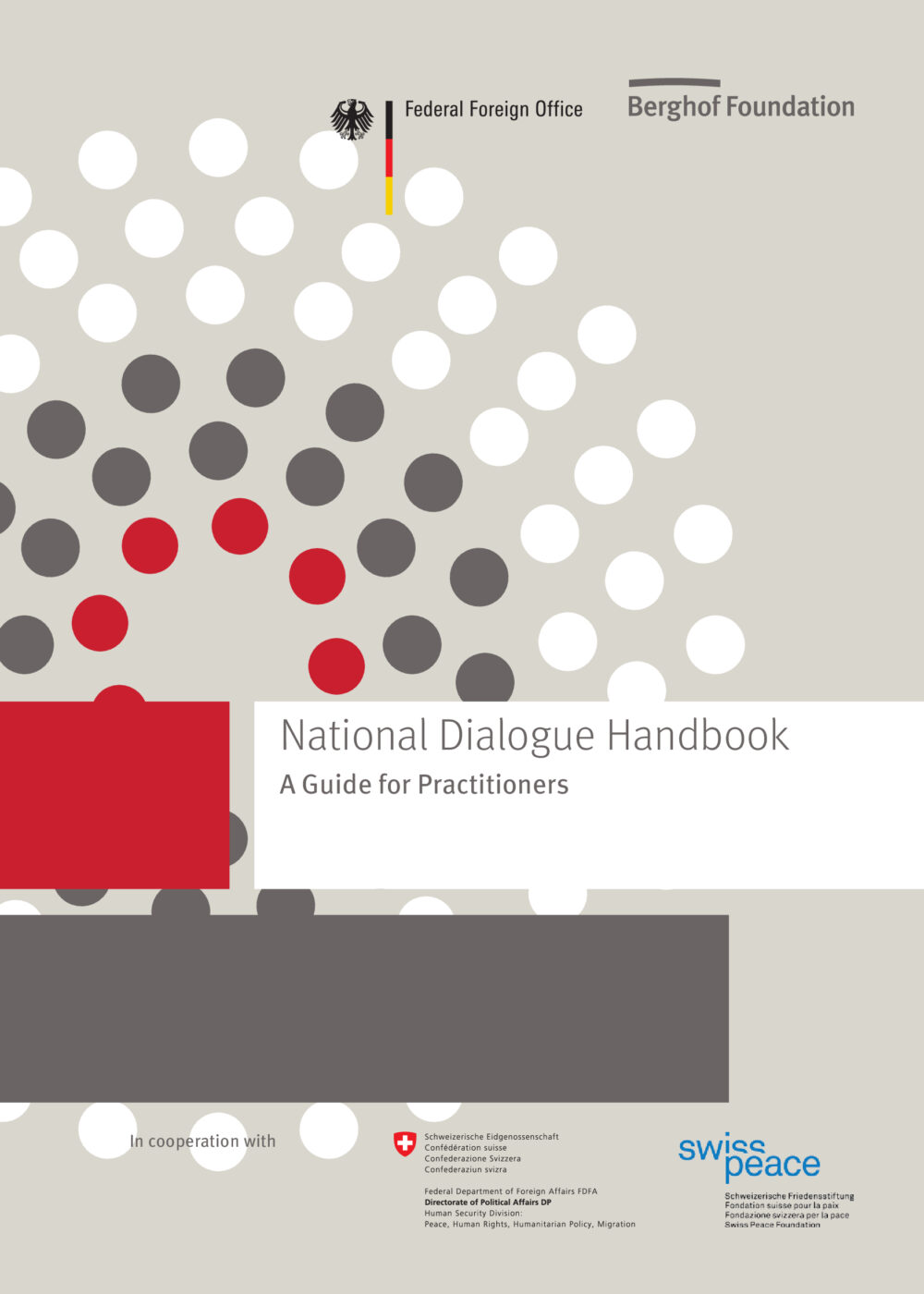
National Dialogue HandbookA Guide for Practitioners
Grounded in a series of contemporary case studies, this Handbook aims to contribute to the nascent debate about National Dialogue, bringing together insights and expertise from diverse regions. In doing so, it seeks to present systematic reflections and offer practical advice. The Handbook thus supports conflict stake-holders and practitioners (both local and international) to grapple with the challenges they face and to pursue the most appropriate design for their particular context. Moving beyond simplistic approaches, the Handbook also seeks to provide an overview of National Dialogue processes, drawing from the expertise and practices of scholars and practitioners.
- Year2017
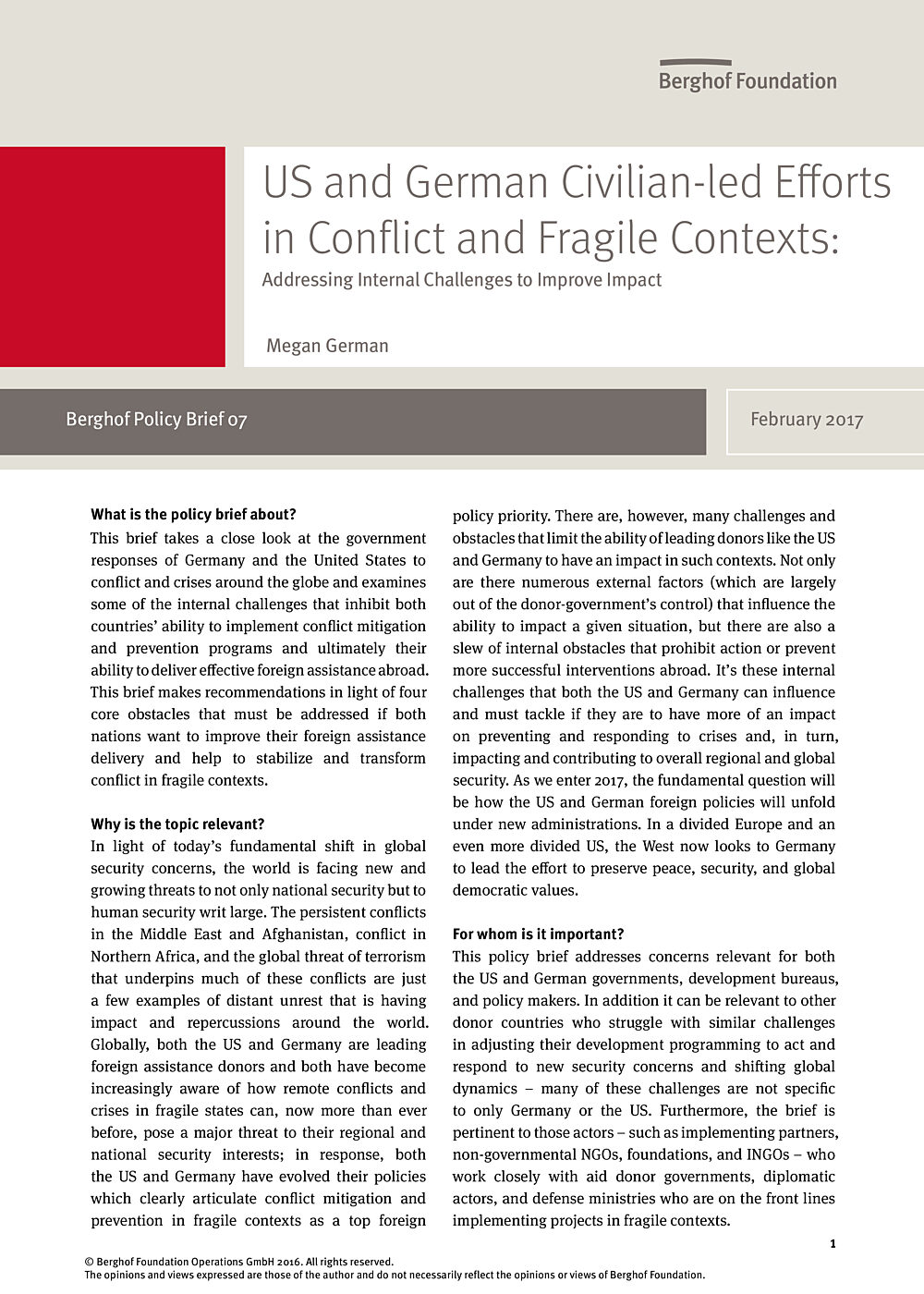
US and German Civilian-led Efforts in Conflict and Fragile Contexts: Addressing Internal Challenges to Improve ImpactPolicy Brief No. 7
This brief takes a close look at the government responses of Germany and the United States to conflict and crises around the globe and examines some of the internal challenges that inhibit both countries’ ability to implement conflict mitigation and prevention programs and ultimately their ability to deliver effective foreign assistance abroad. This brief makes recommendations in light of four core obstacles that must be addressed if both nations want to improve their foreign assistance delivery and help to stabilize and transform conflict in fragile contexts.
- Year2017
- Author(s)Megan German